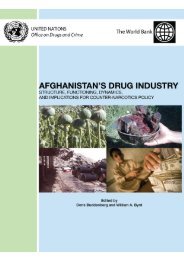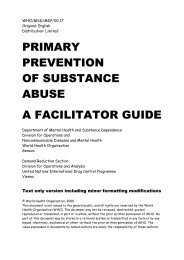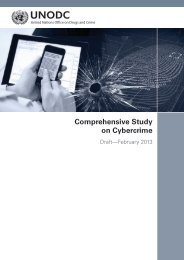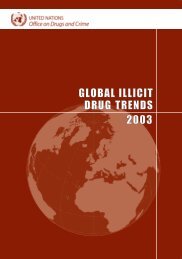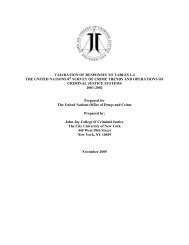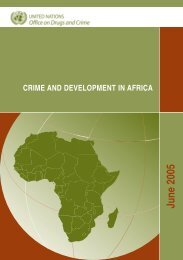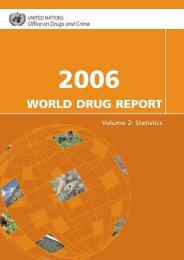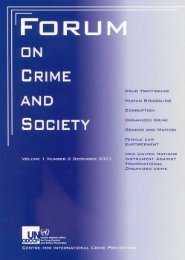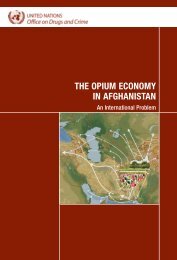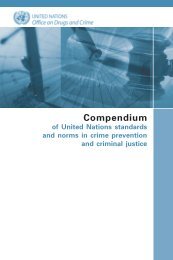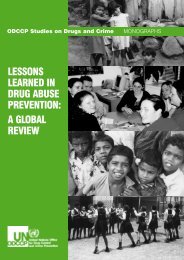Manual for Training Police on Anti Human Trafficking
Manual for Training Police on Anti Human Trafficking
Manual for Training Police on Anti Human Trafficking
You also want an ePaper? Increase the reach of your titles
YUMPU automatically turns print PDFs into web optimized ePapers that Google loves.
Facilitating Change<br />
EXERCISE<br />
<str<strong>on</strong>g>Police</str<strong>on</strong>g> Sensitivity to the Survivors of <strong>Trafficking</strong><br />
Estimated time : 30 mins<br />
Material required : Flip chart, markers, sheet detailing the role play<br />
Methodology : Enactment of role play and interacti<strong>on</strong> with the participants<br />
Expected outcome : At the end of the exercise participants would start to identify some<br />
significant issues in the interacti<strong>on</strong> between themselves (i.e. the police<br />
pers<strong>on</strong>nel) and the survivor of trafficking<br />
Activity<br />
1) Select two sets of participants <str<strong>on</strong>g>for</str<strong>on</strong>g> two separate role plays: <strong>on</strong>e depicts a ‘bad’ police vs. survivor<br />
interacti<strong>on</strong> and the other depicting an alternate ‘good’ police vs. survivor interacti<strong>on</strong>.<br />
2) You may want to select participants be<str<strong>on</strong>g>for</str<strong>on</strong>g>ehand or ask them to volunteer. You can take the help of<br />
the organizing agency to identify your potential ‘actors’.<br />
3) Brief the participants about what they need to do. Describe each character in simple words at the<br />
same time stressing clearly <strong>on</strong> what message you want to come out clearly from each role play.<br />
4) Stress that if the c<strong>on</strong>trast between the two role plays comes out sharp and clear, it will be easy <str<strong>on</strong>g>for</str<strong>on</strong>g><br />
the group to identify issues <str<strong>on</strong>g>for</str<strong>on</strong>g> discussi<strong>on</strong>.<br />
5) Leave the groups to improvise <strong>on</strong> your suggesti<strong>on</strong>s.<br />
6) Once the play has been enacted ask participants to share what they observed. Also, ask them to<br />
list out the differences between the two scenes.<br />
7) Write out the differences in list <str<strong>on</strong>g>for</str<strong>on</strong>g>m <strong>on</strong> the flip chart <str<strong>on</strong>g>for</str<strong>on</strong>g> discussi<strong>on</strong>.<br />
Note to the facilitator<br />
At this stage you can c<strong>on</strong>clude the discussi<strong>on</strong> by highlighting <strong>on</strong> the following four issues (i.e.<br />
helpful attitudes and behaviour; effective communicati<strong>on</strong>; gender sensitivity; human rights<br />
approach) and c<strong>on</strong>necting them with participants’ resp<strong>on</strong>ses <strong>on</strong> the previous role play <str<strong>on</strong>g>for</str<strong>on</strong>g> easy<br />
understanding and clarity of the issues.<br />
1. HELPFUL ATTITUDES AND BEHAVIOUR<br />
<str<strong>on</strong>g>Training</str<strong>on</strong>g>, as shall be examined in the next and c<strong>on</strong>cluding secti<strong>on</strong>, is all about bringing a change in<br />
<strong>on</strong>e’s per<str<strong>on</strong>g>for</str<strong>on</strong>g>mance through applicati<strong>on</strong> and change of/in knowledge, skills and attitude. Stress <strong>on</strong> the<br />
following with your participants and also ask them with which of the previous two police role/<br />
representati<strong>on</strong>s would they want to be identified. Give messages of positive rein<str<strong>on</strong>g>for</str<strong>on</strong>g>cement e.g. that they<br />
are all sensitive officers who can use their positi<strong>on</strong> and laws to help combat this crime:<br />
- Stress that ‘You are an agent of change’. Beginning with trans<str<strong>on</strong>g>for</str<strong>on</strong>g>ming <strong>on</strong>e’s attitude and mindset<br />
will ensure that it also gets translated to a change in behaviour – towards the survivor/witness.<br />
- Such positive changes can be brought about by an understanding of the endangered and vulnerable<br />
state of the survivor, being empathetic thereof, and c<strong>on</strong>sequently being able to implement an<br />
empathetic and sensitive policing protocol/approach.<br />
- Equally important, remind the participants, that ‘You, the police are the ‘delivery agents’ – ensuring<br />
that justice and basic rights of the survivor are delivered to the survivor. You are the intermediary<br />
between the exploiter and the exploited; the police officer should represent the interventi<strong>on</strong> of<br />
justice in a situati<strong>on</strong> of injustice and there<str<strong>on</strong>g>for</str<strong>on</strong>g>e it is of utmost importance that the police pers<strong>on</strong>nel<br />
obtain and maintain the trust of the exploited pers<strong>on</strong>. Due to the circumstances from which they<br />
have been rescued, survivor is in a state of anguish and deep mental ag<strong>on</strong>y. Having been traumatized<br />
<str<strong>on</strong>g>for</str<strong>on</strong>g> such a l<strong>on</strong>g time and been in c<strong>on</strong>tact with apathetic pers<strong>on</strong>s, it is imminent that the police<br />
c<strong>on</strong>duct themselves as a source of ‘positive’ inspirati<strong>on</strong> to these survivors and provide the care and<br />
support that they so urgently need.<br />
53




